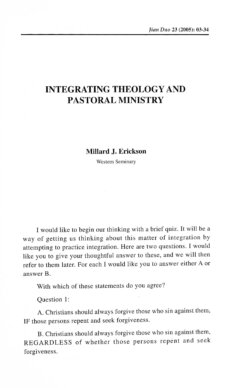Integrating Theology And Pastoral Ministry(神學與教會牧養的結合)/Millard J. Erickson 艾利克森
撮要
艾利克森提出神學與牧職可從三方面作整合:第一,神學學科與非神學學科的結合;第二,神學學科內的整合;第三,神學學科與牧職實踐的結合。他並提出第四個可能整合的範疇是理性與感性。
神學學科與非神學學科整合的模式有三類:第一類是非神學學科的論述可以成為神學的內容;第二類是兩者對立;第三類是互不相干,各有不同向度及基礎。艾利克森陳述了范泰爾(Cornelius Van Til)、約翰•衛斯理(John Wesley)、葛倫斯(Stanley Grenz)及田立克(Paul Tillich)對自然啟示和特殊啟示的看法;並表示贊同田立克的觀點,認為應把信仰內容與深受文化影響的表達形式整合,另外也認同自然啟示是特殊啟示以外的另一種權威。
神學學科內的整合方面,艾利克森認為在聖經註釋的過程中,我們循環地將聖經文本的含意與信條互相印證。他以近年在美國流行的開放神觀(open theism) 為例,指出那些支持上帝會改變心意的人,會引用撒母耳記上十五章作證據,卻沒有注意也有經文表示上帝不會改變心意。艾利克森藉此例子引導我們思考應該根據敘事經文解釋教導性經文,還是根據教導性經文解釋敘事經文。
至於神學學科與牧職實踐的結合,則可分兩個進路:第一是從成功的教會學習一些處事方法;第二是深思牧養的理念,並在不同處境作不同應用。艾利克森提醒我們要認識如何應用與為何如此行的分別。他強調神學訓練並非技工式的訓練;更重要的是認識其背後的原則。同時,他提出了神學教育應具備八大重點。
ABSTRACT
Erickson suggests that theology and pastoral ministry could be integrated in three areas: first, to correlate theological with non-theological disciplines; second, between theological disciplines; and third, with practice of ministry. He also suggests the fourth possible approach: the relationship of the cognitive to the affective.
Concerning the correlation of theological with non-theological disciplines, several positions have been taken: the first position is that, some of the contents of a theology can be derived from non-theological discourse; the second is the idea of mutual antagonism; and the third is of mutual indifference, i.e. the two are of such different orientations that they cannot conflict. Erickson gives an account of Cornelius Van Til, John Wesley, Stanley Grenz and Paul Tillich’s view on general and special revelation. He agrees with Tillich, and suggests that contents of faith should integrate with expressions that are profoundly affected by cultures. Besides, Erickson agrees that general revelation is a different kind of authority other than special revelation.
Concerning integration between theological disciplines, Erickson observes that while we do exegesis, we move back and forth constantly rechecking and readjusting doctrines as we understand the text better. Besides, the author gives an example of open theism, which has been present in America recently, and points out that those who regards God will change His mind usually give 1 Samuel 15 as evidence, yet there also are scriptures indicating that God will not change His mind, but those people have this fact neglected. With such an example Erickson discusses the relation of narrative with didactic passage.
As to the integration of theological disciplines with pastoral ministry, there has been two approaches: one is to learn from successful churches some skills; the other is to rethink the pastoral principles, and to apply to different contexts. Erickson reminds that while applying a certain pastoral principles, one should be able to distinguish the “how” and “why.” He emphasizes that theological training is not mere skill training, and that we also have to understand the backed up principles. As last, the author lists eight suggestions concerning theological education and ministry.
原載於《建道學刊》23期(2005年1月),頁3-34。
最新文章
[電子書]困境與抉擇:「建道研究中心30週年誌慶」跨學科研討會論文集/廖炳堂、倪步曉主編
2025 年 1 月 2 日
一篇特稿:好好事奉主! / 梁國強
2025 年 1 月 1 日
「牧範」與「硬淨」! / 梁國強
2024 年 11 月 1 日
编辑精选
從梧州到長洲:建道神學院125年的挑戰與恩典 / 陳智衡
2023 年 10 月 1 日
微小教會的見證/高銘謙
2023 年 6 月 1 日







